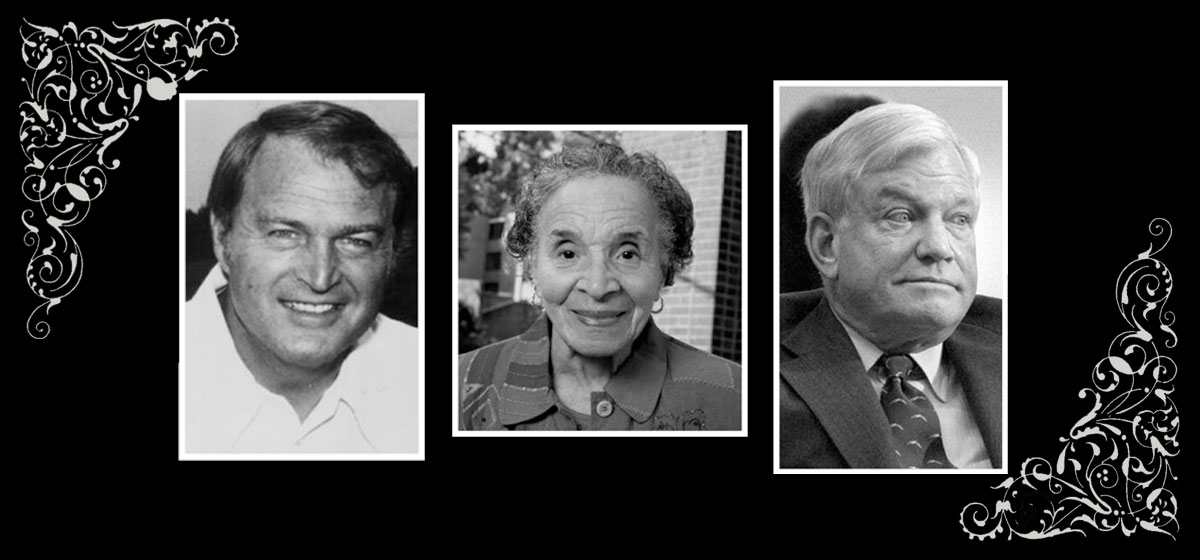Binai, Carlough, Maazel, Werner, Noll, Kimmel, Lovette, Mellon Scaife, McDevitt Rubin

Paul Binai, 81
A former curator of the Carnegie Museum of Art, Binai was a renowned painter whose work has been exhibited throughout the world. Binai was a quiet, erudite man who also served as curator at the Southern Alleghenies Museum of Art and the Detroit Institute of Art. His art was greatly influenced by German Expressionism and often has a stark and provocative quality, tackling such topics as the Holocaust and capital punishment.
Gary Carlough, 62
Carlough was a leading Pittsburgh architect and teacher whose work included the Gateway Center light rail station and numerous projects at the University of Pittsburgh, Carnegie Mellon University, the Carnegie Library and the Carnegie Museums of Pittsburgh. Carlough co-founded EDGE Studio and was a member of the Pittsburgh Art Commission.
Lorin Maazel, 84
A child prodigy, Maazel grew up in Pittsburgh and became one of the world’s greatest conductors. His parents recognized his perfect pitch after he declared that the fading sound following a flushing toilet was a B-flat. He began violin lessons at five and conducting lessons at seven. Conductor Vladimir Bakaleinikoff said the boy was the greatest talent he’d ever seen, and when Bakaleinikoff became associate conductor of the Pittsburgh Symphony Orchestra, the Maazels moved to Pittsburgh so Lorin could study with him. He graduated from Peabody High School at 16, and, after studying at the University of Pittsburgh, joined the PSO as a violinist, later returning as musical director from 1984-1996. During his tenure, he rebuilt the aging orchestra, infusing it with youth and vitality, raising standards and instituting international touring. Maazel was known as a demanding conductor who ushered in a Golden Age for the PSO.
Larry Werner, 80
The longtime leader of the Pittsburgh office of Ketchum, Werner was one of the most influential leaders of the Pittsburgh public relations industry in the past 50 years. A man of integrity whose hallmark was telling the truth, he advised clients to get the truth out and get it out quickly, and he passed that mantra along to the PR professionals he trained over many years. He helped businesses in difficult situations and was part of the crisis response team after the 1989 Exxon Valdez oil spill. A family man, he was known for his love of language, humor and story telling.
Thelma Lovette, 98
Born in the Hill District in 1916, Thelma Lovette was a lifelong advocate for civil rights. The daughter of a plumber and a homemaker, her first job after graduating from Schenley High School during the Depression was as a dishwasher earning $10 a week for 12-hour days. She earned a master’s degree and became the first black social worker at Mercy Hospital, ultimately rising to supervisor. She was the first woman to serve on the board of the Pittsburgh YMCA, and, in 2012, the Hill District YMCA was named in her honor.
Chuck Noll, 82
Noll was the legendary Hall of Fame coach of the Pittsburgh Steelers, leading them to four Super Bowl victories and creating one of the greatest dynasties in professional sports. While his four Super Bowl wins remain unsurpassed among coaches, his contribution to the lives of Pittsburghers was immeasurable. He led the indomitable Steelers to titles during the 1970s, supplying civic pride when the city needed it most—as the local steel industry entered its catastrophic decline. His ethic of work, humility and integrity built the Steeler identity that exists today and laid the foundation for the Steeler Nation. Noll was a coach of intelligence and reserve, whose interests ranged far outside football, which he kept in perspective. He told players to prepare for their days after the game, famously calling it “their life’s work.”
Richard Mellon Scaife, 82
Grandson of Richard Beatty Mellon and Mellon heir, Scaife was the publisher of the Tribune-Review and one of the nation’s leading funders of conservative causes. Locally and nationally, he was a polarizing figure who used his billion-dollar fortune to affect American political life, including investigations of President Bill Clinton; Hilary Clinton once obliquely referred to him as responsible for “a vast right-wing conspiracy.” Scaife also was a prominent Pittsburgh philanthropist, controlling the Sarah Scaife, Carthage and Allegheny Foundations, and funding the redevelopment of Station Square, the Carnegie Museum of Art and a wide array of other organizations.
Mary Margaret Kimmel, 76
Maggie Kimmel was a national leader in children’s literature and former chair of Pitt’s department of library science. Stricken with polio as a child, she was also an advocate for the disabled, helping create the Center for Women with Disabilities at Magee-Womens Hospital. She was a founding member of Beginning with Books, which provided books to low-income children, and was a longtime consultant to “Mister Rogers’ Neighborhood.” She once appeared in an episode telling a story from her wheelchair.
Marilyn McDevitt Rubin, 86
For 26 years, Marilyn McDevitt Rubin was the food editor for The Pittsburgh Press and Post-Gazette. She wove wide-ranging stories from her life into her intimate columns, drawing an audience far beyond food aficionados. She plumbed the depths of her life, including a Father’s Day column recalling how her own father abandoned her family and ending with a stiff drink recipe. After her father left, she spent a decade in an orphanage, learning to love literature and depictions of “the good life”—food, wine and friends—a life she attained and spread through her writing.



